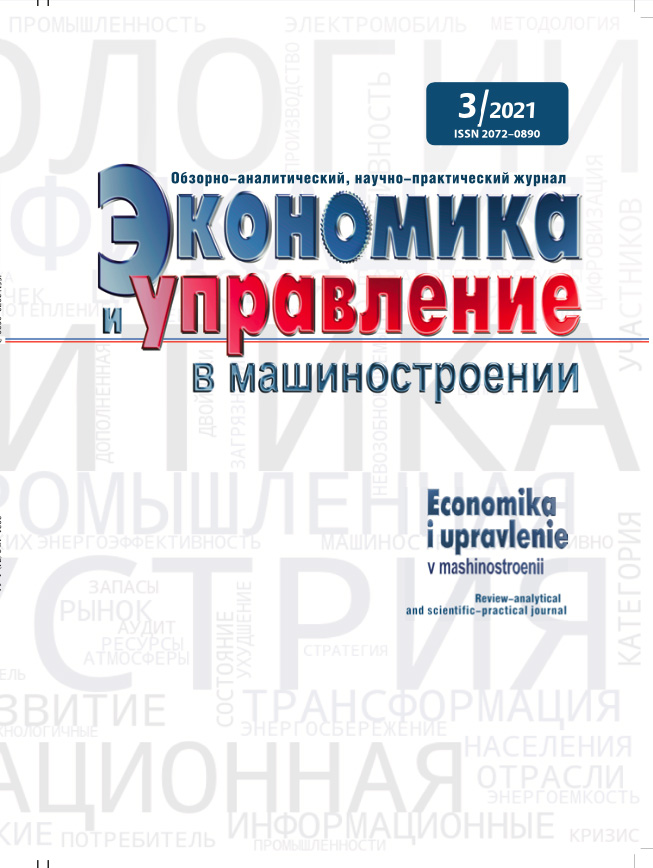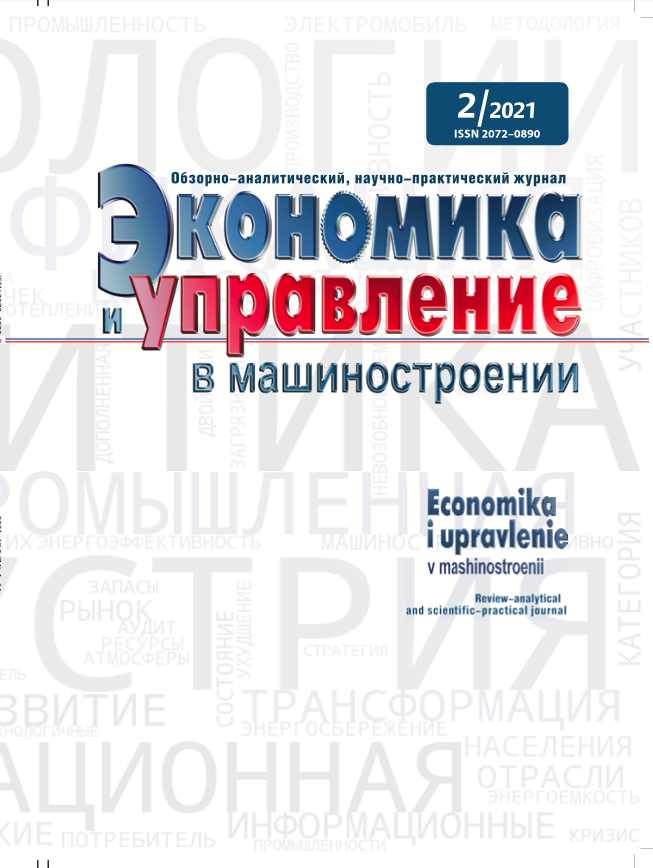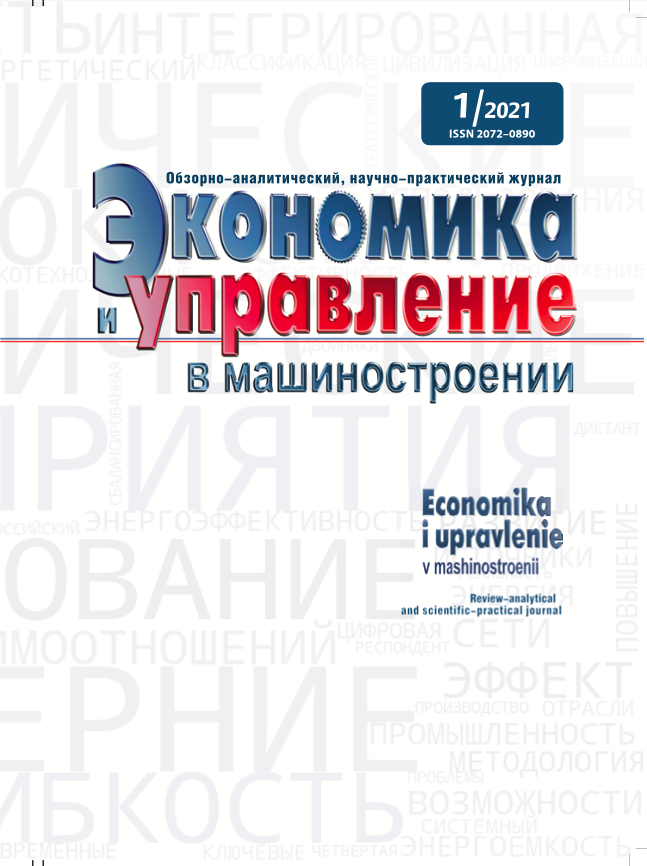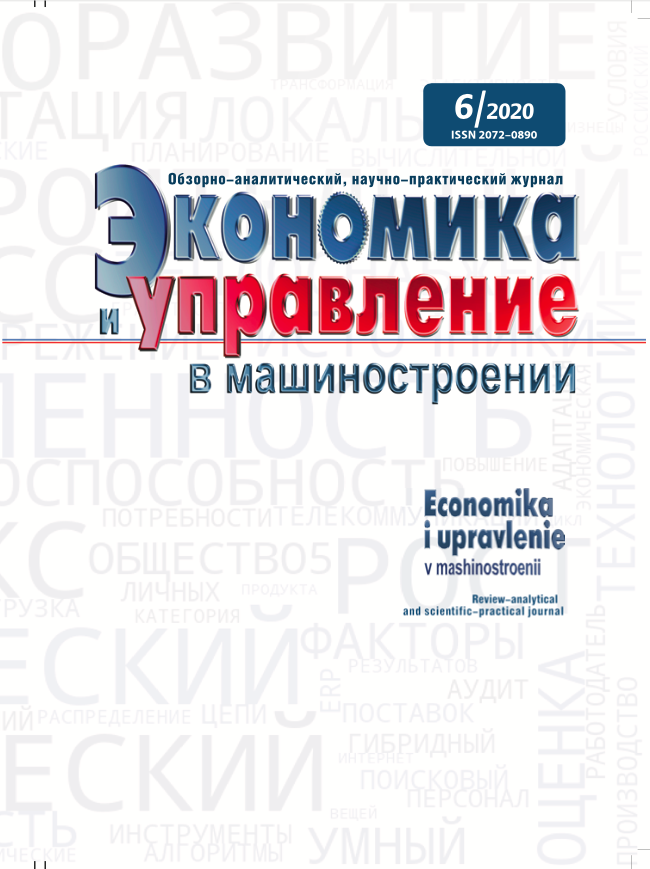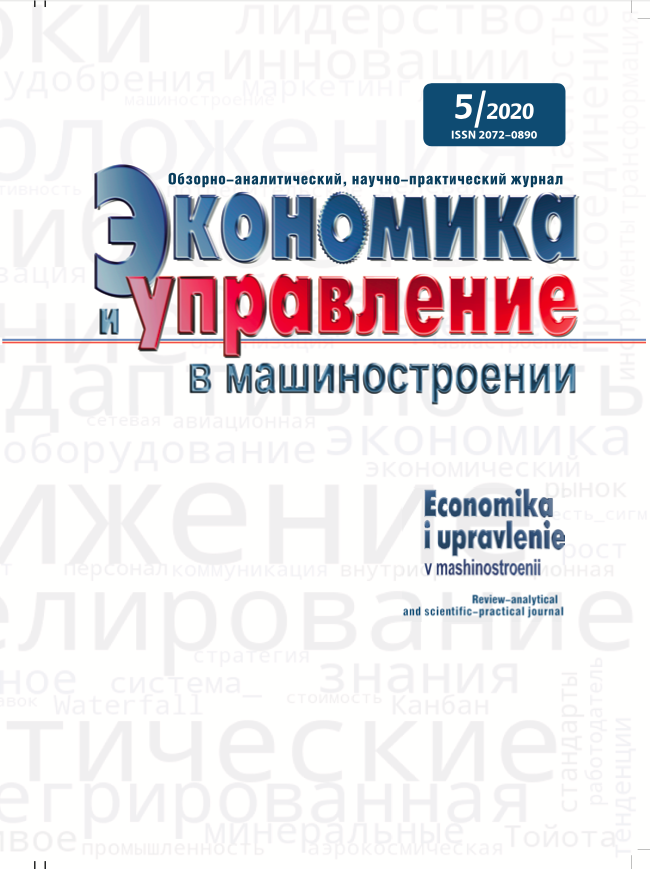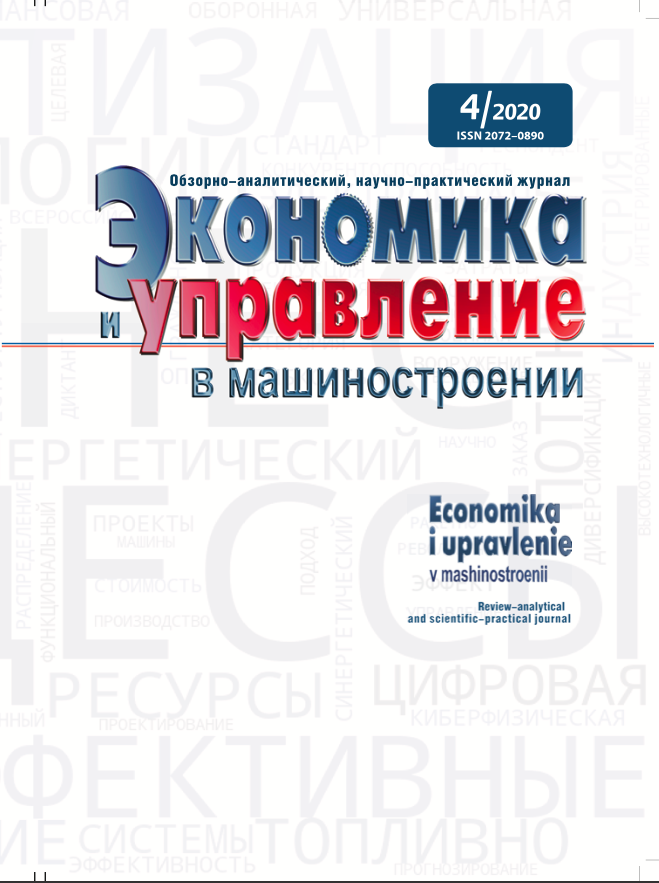OPERATION OF BUSINESS, INDUSTRIAL ENGINEERING
Theoretical basis for designing the organizational and economic structure of innovative energy-efficient clusters (Part 1)
Palamarchuk A. G., postgraduate student at the Management and marketing of high-tech industries Department
Moscow Aviation Institute (National Research University), Moscow
Abstract: The author’s research is devoted to the problems of a new type of cluster structures development − innovative energy-efficient clusters. The author substantiates the relevance of such clusters for the Russian economy modern conditions, taking into account new trends in the high-tech production development and gives the definition of «innovative energy-efficient cluster». The organizational and economic structure of the innovative energy-efficient cluster is being developed, within the framework of which special attention is paid to the digital transformation of its participants, as well as the introduction of a set of energy- efficient technologies at the level of the entire cluster. As a solution to the task of information integration of cluster members, the author proposes the creation of a cloud management system – digital cluster cloud.
Keywords: cluster economy, innovative energy-efficient cluster, digital transformation, production digitalization, energy efficiency, energy service, cloud computing technology
Industry in the digitalization era: analysis of the state and main development directions (using the example of mechanical engineering) (Part 2)
Valieva Z. G., applicant at the Management and marketing of high-tech industries Department
Moscow Aviation Institute (National Research University), Moscow
Abstract: Modern Russian industry is the basis for ensuring national competitiveness, as well as sustainable GDP growth, driven mainly by growing high-tech contents of such segment as engineering. The mechanical engineering development is currently at the junction of two problems that reflect both general trends in the industrial policy development, and taking into account the specifics of digitalization and cluster approaches in the industry. In this regard, a series of two articles is proposed, in which these problems are considered. This article is devoted to the formation of the mechanical engineering leadership potential as a result of the industrial clusters evolution under the digitalization influence.
Keywords: leadership potential of mechanical engineering, evolution of industrial clusters, digital economy
Potential of mergers and acquisitions transactions in stimulating digital transformation in the fuel and energy complex..
Kovalchuk Ju. A., doctor of Economic Sciences, professor, professor at the Energy service and energy saving management Department
Moscow Aviation Institute (National Research University), Moscow
Stepnov I. M., doctor of Economic sciences, professor
Head of Asset Management Department
MGIMO University, Moscow
Professor at the Corporate Finance and Corporate Governance Department
Financial University under the Government of the Russian Federation, Moscow
Deryagina T. I., студентка
Financial University under the Government of the Russian Federation, Moscow
Abstract: The article presents the research results of the feasibility, aspects and advantages of implementing mergers and acquisitions in Russian energy sector. Approaches to assessing the mergers and acquisitions essence and the effectiveness of these transactions, as well as options for integration processes and business consolidation are considered. Quantitative industry trends of the Russian M&A market are determined, taking into account the influence of economic and geopolitical factors. The directions and features of integration processes in the industry and the future energy business transformation are highlighted, taking into account the digital and intelligent network technologies development and alternative energy sources.
Keywords: mergers and acquisitions, digital transformation, business transformation, energy industry sector, trans- action, synergetic effect
INNOVATIVE INVESTMENT ACTIVITY
Conceptual foundations of innovative industry cluster development (Part 1)
Andrianov A. M., postgraduate student at the Management and marketing of high-tech industries Department
Moscow Aviation Institute (National Research University), Moscow
Abstract: The author’s research is based on a comprehensive analysis of the historical context and methodological aspects of the theory and principles of cluster building development in the modern innovation industry. The author pays special attention to the research of modern normative-legal support development in the sphere of cluster creation, as well as cluster structures already operating in the Russian economy. The role and influence of government ministries on the Russian clusters construction is defined.
Keywords: cluster, innovative industry, state industrial policy, pilot innovative territorial clusters, digital economy, intellectual-technological industrial cluster
Fundamentals of the team organization for the intelligent innovation and industrial cluster formation (Part 1)
Anisimov K. V., postgraduate student at the Management and marketing of high-tech industries Department
Moscow Aviation Institute (National Research University), Moscow
Abstract: The article is devoted to the foundations development of the team organization for the intelligent innovative-industrial cluster formation. The author analyses the latest trends in the cluster economics development, determines the need to form a new type of cluster structures – intelligent innovation and industrial clusters. The team structure for this type of clusters formation is being developed, taking into account the powers distribution of its participants in five functional planes corresponding to individual types of tasks for its participants integration. Specific tasks and functions of team members within individual planes are defined.
Keywords: innovation, digital transformation, Industry 4.0, intelligent innovation-industrial cluster, cluster forma- tion team
ENERGY SAVING AND ENERGY EFFICIENCY
Formation of energy efficiency indicators system of the high-tech industrial enterprise
Koshelev A. S., assistant at the Management and marketing of high-tech industries Department
Moscow Aviation Institute (National Research University), Moscow
Abstract: The article is devoted to the formation of energy efficiency indicators system in the context of a high- tech industrial enterprise. Taking into account the need to develop a system solution when analyzing and evaluating implemented technologies aimed at improving energy efficiency, the author conducts a structural indicators system construction with subsequent analysis of the blocks included in it.ующим анализом входящих в нее блоков.
Keywords: energy-efficient technologies, energy saving, visualization, energy saving potential, innovations, indica- tor system, industry, analysis, energy saving assessment, energy efficiency dynamics
Using blockchain technologies to improve energy efficiency
Pushkarev M. D., student
Moscow Aviation Institute (National Research University), Moscow
Pushkareva M. B., candidate of Economic sciences, associate professor at the Energy service and energy saving management Department
Moscow Aviation Institute (National Research University), Moscow
Abstract: The article provides an overview of the fundamental principles underlying blockchain technologies, such as system architecture and consensus algorithms. The article analyzes the current state of the market and presents blockchain solutions for the energy industry. The basis of the study was an analysis of 140 research projects and startups, as a result of which the potential and relevance of the use of blockchains in the energy sector was revealed. In the work, the use of blockchain was classified depending on the area of activity, the implementation platform and the fundamental principles used.
Keywords: blockchain, energy industry, innovation, energy efficiency, internet of things
Green energy for private consumers: the case of the Republic of Dagestan
Naloeva L. Z., student
Financial University under the Government of the Russian Federation, Moscow
Stepnov I. M., doctor of Economic sciences, professor
Head of Asset Management Department
MGIMO University, Moscow
Professor at the Corporate Finance and Corporate Governance Department
Financial University under the Government of the Russian Federation, Moscow
Abstract: The article presents green energy’s development assessment in terms solar installations introduction in the private sector on the example of one of the Russian regions characterized by special natural and climatic conditions. The features of the spread of alternative and, in particular, solar energy in the world, advantages and limitations for Russia are determined. The results of the electricity tariff calculations of the solar panels installation by private consumers in the Republic of Dagestan are presented, including a comparison with the current tariffs and investment return assessment from a solar station. The role of state support and prospects for the green technologies dissemination are determined.
Keywords: green energy industry, electricity shortage, solar installations, renewable energy sources, investments
EDUCATION AND PERSONNEL TRAINING
Analysis of the Fourth all-Russian Economic dictation results (Part 4).
Golov R. S., doctor of Economic sciences, professor, Head of the Management and marketing of high-tech industries Department
Moscow Aviation Institute (National Research University), Moscow
Abstract: The article discusses the Fourth all-Russian economic dictation results, which is held annually to determine and improve the level of economic literacy of Russia. A comparative analysis of the participants’ quantitative and qualitative composition and the dictation results in 2019 and 2020 is carried out. The important practical result of the action and its further development necessity are noted.
Keywords: all-Russian economic dictation, respondent, participants category, results distribution, economic popula- tion activity, economic population literacy
Methodological frameworks for assessing the educational process effectiveness in the pandemic era
Zubeeva E. V.,candidate of Economic sciences, associate professor at the Management and marketing of high-tech industries Department
Moscow Aviation Institute (National Research University), Moscow
Businova L. S., senior lecturer at the Physical education Department
Moscow Aviation Institute (National Research University), Moscow
Abstract: This article is intended to consider the difficulties and possibilities of assessing the educational process effectiveness in universities in the era of distance learning. The main emphasis concerns such issues as the place of online learning in the distance learning system, the advantages and disadvantages of online learning, tools for assessing the effectiveness of online learning from the perspective of three sides of the educational process: student, university, employer. Conclusions were drawn on the importance and necessity of constant interaction of the participants in the educational process in order to achieve the ultimate goal – the constant improvement of the educational process quality.ва образовательного процесса.
Keywords: university, student, lecturer, online learning, pandemic, questionnaire, assessment, performance, engagement, health
Lean technologies in the University 4.0 concept implementation for high-tech industries enterprises
Eropkin A. M., candidate of Economic sciences, associate professor at the Management and marketing of high-tech industries Department
Moscow Aviation Institute (National Research University), Moscow
Mezina N. A., candidate of Economic sciences, associate professor at the Management and marketing of high-tech industries Department
Moscow Aviation Institute (National Research University), Moscow
Abstract:
The article considers the introduction of lean production approaches and tools in the educational process of higher professional education as part of the of the modern concept University 4.0 implementation. Special attention is paid to the training of economic and managerial personnel for knowledge-intensive and high-tech sectors of domestic industry. It is emphasized that the concept of University 4.0 clearly sets the task, firstly, to consider the educational process in its triunicity: the educational process itself, theresearch process and the educational process, and secondly, when preparing economic and managerial personnel, pay due attention to the education object orientation, the graduate’s complex knowledge formation, skills in the field of technics and technology designed and implemented in the relevant sectors.
Keywords: University 4.0, lean technology, educational process, personnel for high-tech industries
ANALYTICAL RESEARCH
Analysis of the state and prospects of the mechanical engineering development (Part 2)
Kostygova L. A., doctor of Economic sciences, professor at the Management and marketing of high-tech industries Department
Moscow Aviation Institute (National Research University), Moscow
Abstract: This article is the second in a series devoted to the analysis of the state and prospects of the mechanical engineering development. It deals with the problem of sustainable development of the machine-building complex in modern conditions. The article articulates and describes the requirements for the mechanical engineering development. It has been established that compliance with these requirements is possible with the industry sustainable development. On the example of Scania-Rus, the world’s leading manufacturer of heavy trucks and buses, the state of sustainable development in mechanical engineering is considered. It was established that further improvement of the sustainable development process in the industry is possible through the formation, analysis and improvement of end-to-end supply chains. The expected results of sustainable development of mechanical engineering in this direction are determined.
Keywords: sustainable development of mechanical engineering, improvement of end-to-end supply chains

